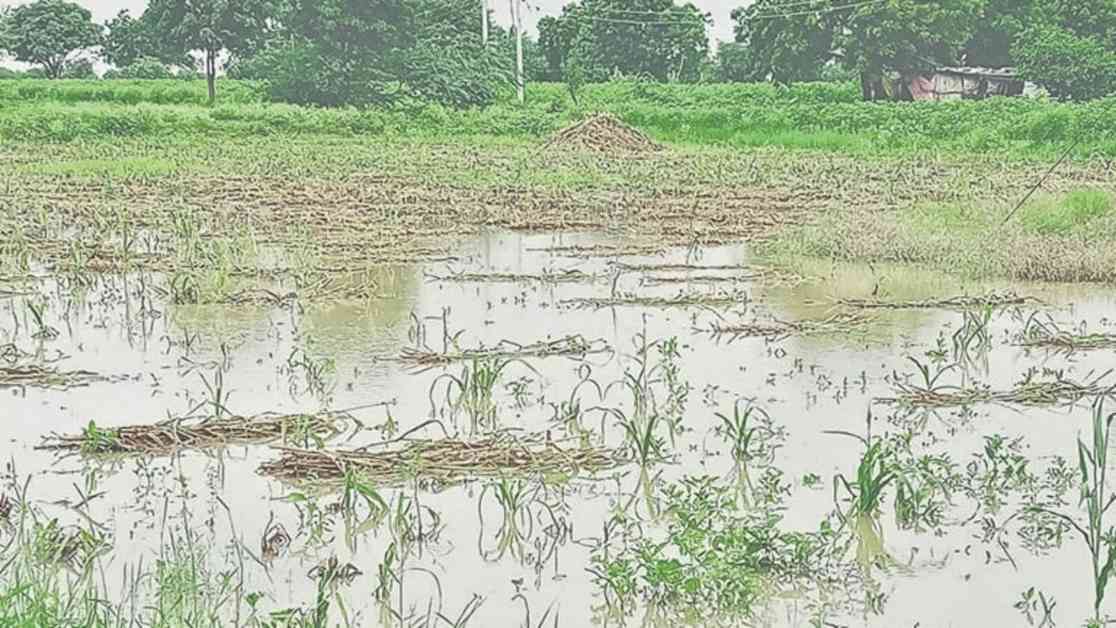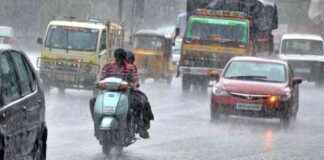Torrential rains have wreaked havoc in the Marathwada region of Maharashtra, a place historically known for its struggles with droughts. The recent downpour has led to a tragic loss of life, with four individuals reportedly drowning in floodwaters. Alongside human casualties, the deluge has also claimed the lives of 88 cattle and caused damage to 135 houses. The aftermath of the heavy rainfall has left 284 revenue circles grappling with the consequences of nature’s wrath.
Submerged in Crisis: Impact on Marathwada Region
The Marathwada region comprises eight districts—Chhatrapati Sambhaji Nagar, Jalna, Parbhani, Hingoli, Beed, Nanded, Latur, and Dharashiv—all of which have been severely impacted by the recent torrential rains. The heavy downpour has disrupted normal life, particularly in Parbhani, Hingoli, and Nanded, where river levels surged beyond warning thresholds. Residential areas and farmlands near these rivers have been submerged, necessitating rescue operations and the evacuation of residents to safer locations.
Local administration and political leaders have been at the forefront of relief efforts, working tirelessly to ensure the safety and well-being of affected communities. The inundation of farmlands has dealt a significant blow to kharif crops, posing a new challenge for farmers who had been hopeful for a bountiful harvest following adequate rainfall earlier in the season.
Infrastructure Struggles Amidst Nature’s Fury
The torrential rains in Marathwada have not only wreaked havoc on lives and livelihoods but have also exposed the region’s infrastructure vulnerabilities. The inundation of residential areas and farmlands highlights the pressing need for improved drainage systems and flood management measures. As rivers overflow their banks, the lack of adequate flood control mechanisms has exacerbated the situation, leading to widespread damage and displacement.
Roads and bridges have been washed away in the deluge, further impeding rescue and relief efforts in the affected areas. The disruption of transportation networks has hindered the delivery of essential supplies and services to those in need, exacerbating the already dire humanitarian crisis unfolding in Marathwada. The destruction of critical infrastructure underscores the urgent need for investment in resilient and sustainable development practices to mitigate the impact of future natural disasters.
Humanitarian Response and Community Resilience
In the face of adversity, the spirit of solidarity and resilience shines through as communities come together to support one another during these challenging times. Local volunteers, NGOs, and humanitarian organizations have mobilized to provide emergency aid, shelter, and medical assistance to those affected by the floods. The outpouring of support from across the region and beyond is a testament to the strength and compassion of the human spirit in times of crisis.
As the waters recede and the extent of the damage becomes clearer, the road to recovery will be long and arduous for the people of Marathwada. Rebuilding homes, restoring livelihoods, and revitalizing agriculture will require sustained efforts and resources from both government agencies and civil society. The resilience and determination of the communities affected by the floods will be crucial in navigating the challenges ahead and building a more resilient future for the region.
Economic Fallout and Agricultural Losses
The torrential rains have not only caused loss of life and infrastructure damage but have also dealt a severe blow to the agricultural sector in Marathwada. The inundation of farmlands has led to the destruction of kharif crops, including soybean, cotton, and sugarcane, which were crucial sources of income for farmers in the region. The loss of crops will have far-reaching economic consequences, affecting not just farmers but also the entire supply chain and local economy.
The agricultural losses incurred due to the floods will exacerbate the existing challenges faced by farmers in Marathwada, who have long struggled with droughts and water scarcity. The impact of the recent deluge on crop yields and farm incomes will be felt for months to come, further deepening the economic hardships faced by rural communities in the region. As farmers assess the extent of the damage and begin the process of recovery, the need for financial assistance, crop insurance, and sustainable agricultural practices becomes more pressing than ever.
Environmental Concerns and Climate Change
The torrential rains and subsequent floods in Marathwada are not isolated incidents but part of a larger pattern of extreme weather events linked to climate change. The increasing frequency and intensity of rainfall in the region are clear indicators of the changing climate and its impact on vulnerable communities. The devastation caused by the floods serves as a stark reminder of the urgent need to address climate change and its consequences on both the environment and human lives.
The destruction of farmlands, loss of biodiversity, and contamination of water sources due to the floods highlight the interconnectedness of environmental health and human well-being. As the region grapples with the aftermath of the deluge, efforts to mitigate the impact of climate change, conserve natural resources, and promote sustainable development practices become more critical than ever. Building resilience to climate-related disasters and adapting to the changing environmental conditions will be key to safeguarding the future of Marathwada and its inhabitants.
Rebuilding for a Resilient Future
As the waters recede and the initial shock of the floods subsides, the focus shifts towards rebuilding and recovery in Marathwada. The road ahead is fraught with challenges, but it is also an opportunity to reimagine and rebuild a more resilient and sustainable future for the region. Investments in infrastructure, disaster preparedness, and climate adaptation measures will be crucial in mitigating the impact of future natural disasters and building community resilience.
The collective efforts of government agencies, civil society organizations, and local communities will be essential in the rebuilding process, ensuring that the needs of the most vulnerable are met and that no one is left behind. The lessons learned from the recent floods in Marathwada will serve as a catalyst for change, driving efforts to strengthen disaster resilience, promote sustainable development, and protect the environment for future generations. As the region embarks on a journey of recovery and renewal, the spirit of solidarity and resilience that has emerged in the face of adversity will guide the way towards a brighter and more sustainable future for all.




















